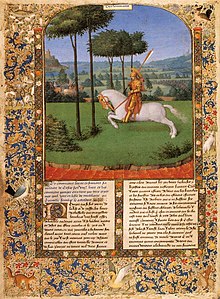Caesar’s civil war
| Caesar's Civil War | |||||||
|---|---|---|---|---|---|---|---|
| Part of the Roman civil wars | |||||||
 The Flight of Pompey after the Battle of Pharsalus-15th century |
|||||||
|
|||||||
| Belligerents | |||||||
| Julius Caesar and supporters, the Populares | Roman Senate, the Optimates | ||||||
| Commanders and leaders | |||||||
|
Gaius Julius Caesar Gaius Scribonius Curio † Mark Antony Decimus Junius Brutus Albinus Publius Cornelius Sulla Gnaeus Domitius Calvinus |
Pompey † Titus Labienus † Metellus Scipio † Cato the Younger † Gnaeus Pompeius † Publius Attius Varus † Sextus Pompey |
||||||
The Great Roman Civil War (49–45 BC), also known as Caesar's Civil War, was one of the last politico-military conflicts in the Roman Republic before the establishment of the Roman Empire. It began as a series of political and military confrontations, between Julius Caesar (100–44 BC), his political supporters (broadly known as Populares), and his legions, against the Optimates (or Boni), the politically conservative and socially traditionalist faction of the Roman Senate, who were supported by Pompey (106–48 BC) and his legions.
Prior to the war, Caesar had served for eight years in the Gallic Wars. He and Pompey had, along with Marcus Licinius Crassus, established the First Triumvirate, through which they shared power over Rome. Caesar soon emerged as a champion of the common people, and advocated a variety of reforms. The Senate, fearful of Caesar, demanded that he relinquish command of his army. Caesar refused, and instead marched his army on Rome, which no Roman general was permitted to do. Pompey fled Rome and organized an army in the south of Italy to meet Caesar.
The war was a five-year-long (49–45 BC) politico-military struggle, fought in Italy, Illyria, Greece, Egypt, Africa, and Hispania. Pompey defeated Caesar in 48 BC at the Battle of Dyrrhachium, but was himself defeated much more decisively at the Battle of Pharsalus. The Optimates under Marcus Junius Brutus and Cicero surrendered after the battle, while others, including those under Cato the Younger and Metellus Scipio fought on. Pompey fled to Egypt and was killed upon arrival. Scipio was defeated in 46 BC at the Battle of Thapsus in North Africa. He and Cato committed suicide shortly after the battle. The following year, Caesar defeated the last of the Optimates in the Battle of Munda and became Dictator perpetuo (Dictator in perpetuity or Dictator for life) of Rome. The changes to Roman government concomitant to the war mostly eliminated the political traditions of the Roman Republic (509–27 BC) and led to the Roman Empire (27 BC–AD 476).
...
Wikipedia
